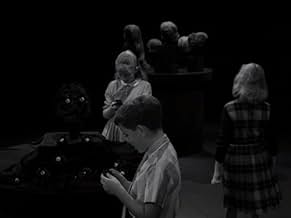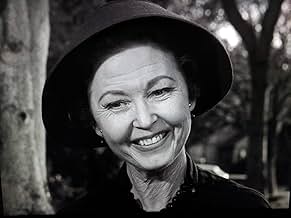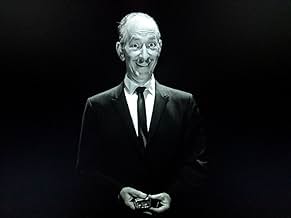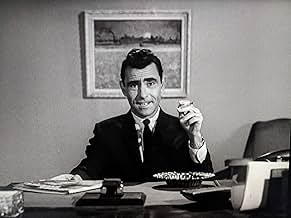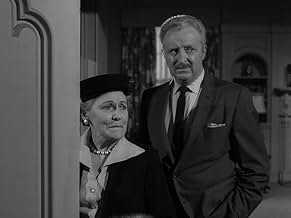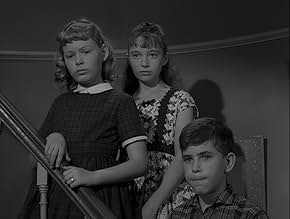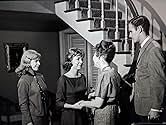I Sing the Body Electric
- Épisode diffusé le 18 mai 1962
- TV-G
- 25min
NOTE IMDb
7,1/10
2,7 k
MA NOTE
Ajouter une intrigue dans votre langueRecent widower George Rogers, needing loving care for his three young children, orders a cybernetic "grandmother". While two of his children accept her, one of his daughters fiercely rejects... Tout lireRecent widower George Rogers, needing loving care for his three young children, orders a cybernetic "grandmother". While two of his children accept her, one of his daughters fiercely rejects her, with near tragic consequences.Recent widower George Rogers, needing loving care for his three young children, orders a cybernetic "grandmother". While two of his children accept her, one of his daughters fiercely rejects her, with near tragic consequences.
- Réalisation
- Scénario
- Casting principal
David Armstrong
- Van Driver
- (non crédité)
Rod Serling
- Narrator
- (non crédité)
- …
Avis à la une
Quite a few people will be quick to say that THE TWILIGHT ZONE needs to be held to one and only one standard, thinking that they individually or collectively knew what best was going on in Rod Sterling's mind. If that truly were the case, and most self-appointed critics in general were allowed to interpret Serling as they thought best for them, stories such as I SING THE BODY ELECTRIC, I AM THE NIGHT - COLOR ME BLACK, CAVENDER IS COMING, MR. BEVIS, THE NIGHT OF THE MEEK, A TOWN CALLED WILLOUGHBY, or THE BIG TALL WISH wouldn't be allowed to exist, because the general level of acceptance would be based solely on a level of improbable supernatural science fiction, as sought by much of his audience past and present. Serling was wise to appreciate that EVERYONE'S feelings needed representation and consideration. So what if he introduced schmaltz or sentimentality every once in a while? His wisdom in doing so allowed others who normally wouldn't care for THE TWILIGHT ZONE to enjoy an episode or two on occasion and find elements they personally could identify with. As for Ray Bradbury, his short story bring turned into the episode I SING THE BODY ELECTRIC was still accepted for broadcast, whether or not it was the only one of his accepted. To malign either Bradbury's
overall approach to his ideals of science fiction or Serling's treatment of Bradbury's story only serves as chest-beating moments for those who insist that they understood and understand what these two men meant. But do they - really? And what about those who want to appreciate the two on a level that they can understand and accept?
TZ seemed (and still seems) to be largely categorized by many viewers as necessary to give jolts to senses that were and are dulled by life's overstimulation (a categorization obviously also assigned to Alfred Hitchcock). This could be a main reason why episodes like I SING THE BODY ELECTRIC might be panned (in this case, along with its original author, Ray Bradbury) when many actually find it as fine a TZ episode as MR. BEVIS, CAVENDER IS COMING, NIGHT OF THE MEEK, A GAME OF POOL, THE TRADE-INS, or even I AM THE NIGHT: COLOR ME BLACK. Such plainly human episodes as these (along with several more) were able to make their point without having to go to unsettling superhuman or subhuman bodily extremes to do so. Rod Serling made it a point of telling - and showing - more than one kind of tale, fully appreciating the fact that he had (and still has) more than one kind of audience...
The line above is spoken by a little boy to his robot grandma regarding her eyes. I'm glad she didn't pull them out to play marbles with. On the rare occasions when TZ went in deep for sentimentality (like 'Night Of The Meek') it tended to fail, even though there are many wonderful moving moments in the series. This robo-grandma-knows-best tale is a mess (two directors). I wish I could say otherwise as it was written by the normally indescribably brilliant Ray Bradbury, and this was his one contribution to the Zone. The story is a little silly, as a father (David White) takes his three children to a showroom of Facsimiles Limited to pick out the components that will make up their robot grandma. The children opt for parts that make up a gentle character played by Josephine Hutchinson. The dissenter, Anne (Veronica Cartwright- always has been a very good actress) needs a lot more convincing of Grandma's worth and is still angry from her mother's death. A strong theme but is a robot the answer?
Please don't judge 'The Twilight Zone' or Ray Bradbury's writing by this anomalous effort.
Please don't judge 'The Twilight Zone' or Ray Bradbury's writing by this anomalous effort.
I remember the story in a Ray Bradbury anthology. He had a thing for robots. This is a pretty lightweight effort. Not that it's a bad story; it's just that there are so many unanswered questions. Why did the cruel aunt not return at some point? How much does this cost? It's just taken for granted. That's why Ray Bradbury is a fantasist and less of a science fiction writer. The story is much more about the little girl coming to grips with the loss of her mother than the science. Robots have this thing about sacrifice and this comes through. Anyway, it all works out but we are left to guess the humanity of the robot. It's a feel good episode, but it isn't as gut wrenching as the reality of the little girl.
This was such a beautiful, special episode that it stayed with me for years. And it was such lovely story that years later it was made into a special one-hour movie starring Maureen Stapleton, called "The Electric Grandmother".
Very touching, I can't believe all these other comments about how it was flat and not very well acted, I think this episode was just marvelous.
Not a scary episode, like some of the other old TZ episodes (like the one where the old lady in the wheelchair was getting crank calls on stormy nights, or where the kid could wish you into a cornfield, or where Talky Tina the doll would come kill the evil stepfather), although I did appreciate those other episodes for their uniqueness, as well.
Safe to watch with your kids, it won't scare them, and I have to recommend it, as someone who deals with the griefstricken in my work, as a great show to help people start addressing their grief, which usually includes - and usually starts with - anger.
Very touching, I can't believe all these other comments about how it was flat and not very well acted, I think this episode was just marvelous.
Not a scary episode, like some of the other old TZ episodes (like the one where the old lady in the wheelchair was getting crank calls on stormy nights, or where the kid could wish you into a cornfield, or where Talky Tina the doll would come kill the evil stepfather), although I did appreciate those other episodes for their uniqueness, as well.
Safe to watch with your kids, it won't scare them, and I have to recommend it, as someone who deals with the griefstricken in my work, as a great show to help people start addressing their grief, which usually includes - and usually starts with - anger.
Le saviez-vous
- AnecdotesRay Bradbury submitted several scripts to The Twilight Zone, but this was the only one produced.
- GaffesAt the end, all three siblings go off to college at the same time. How could all three be the same age, unless they were triplets, adopted or a combination of something else? This quandary is not explained in the story. However, it's more likely that two of the children were already in college when the third was entering college.
- ConnexionsEdited from La quatrième dimension: Young Man's Fancy (1962)
Meilleurs choix
Connectez-vous pour évaluer et suivre la liste de favoris afin de recevoir des recommandations personnalisées
Détails
- Durée25 minutes
- Couleur
- Rapport de forme
- 1.33 : 1
Contribuer à cette page
Suggérer une modification ou ajouter du contenu manquant

Lacune principale
What is the Spanish language plot outline for I Sing the Body Electric (1962)?
Répondre
